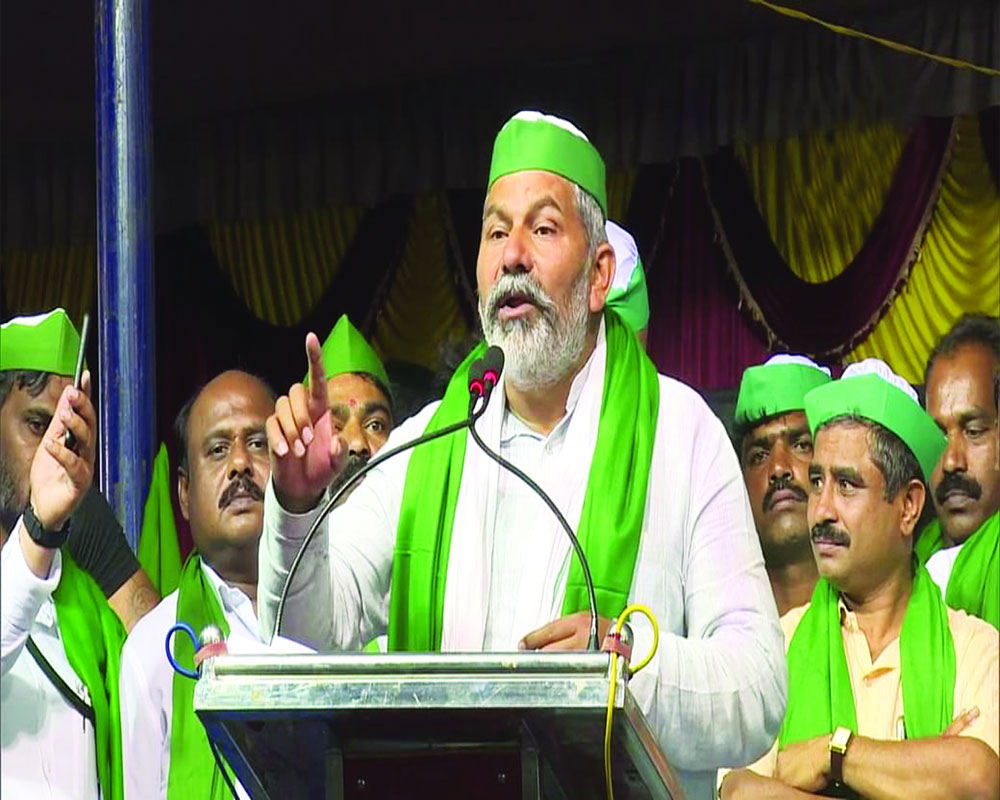Rakesh Tikait’s March campaign, which covered Nandigram to Rajasthan and Punjab to Tamil Nadu, turned heads everywhere
As the Samyukta Kisan Morcha was blocking roads all across India on March 26 and celebrating Bharat Bandh, the situation in Ahmedabad got out of hand. The Bharatiya Kisan Union’s (BKU) Yudhvir Singh was arrested in the middle of a press conference. The arresting officer, with the IPS stars on his shoulder lapel, told the media that the “arrest is being made because no permission was taken”. Since when is the Government’s permission required to host a press conference? Keep in mind that there was no protest or demonstration at the site, and the press meeting was being attended by only a few people. Still, did the event undermine Prime Minister Narendra Modi?
By arresting Yudhvir, a seasoned leader having a long-term relationship with the Tikait family, the Gujarat Government did him a political favour as a normal press conference turned into national news and the BKU’s second-level leadership is now headed towards national fame. The Modi Government may have actually helped Rakesh Tikait’s BKU by making Yudhvir a twitter martyr.
But, was the arrest necessary to nullify the press conference? By any measure, no. So, the schemes being hatched in the Modi-Shah mind are unfathomable. Are they trying to divide the Kisan Morcha by playing favourites? By giving the Tikait faction more limelight, they may cause tension among the 40-leader group. This is very much like Modi. Keep in mind, Yudhvir was later released and he participated in the Kisan panchayat in Rajasthan on March 27.
Yudhvir and Rakesh Tikait came out strongly against the “oppression” of the Modi Government at the centre and in Gujarat. They termed it the “Gujarat model of slavery” and said the “people and farmers of Gujarat were not free”. These statements are powerful as in Mahatma Gandhi’s home State, people are being arrested for holding a press conference. It looks like a political blunder to detain and release Yudhvir the same day.
But let us consider another possibility — Is Modi actually getting scared of Tikait’s tactics and messages? Since the night of January 27, Rakesh has catapulted himself into national politics by gaining huge support from the Jat-dominated belts of Rajasthan to UP. His March campaign, which covered Nandigram to Pipad, Rajasthan, and Punjab to Tamil Nadu, turned heads everywhere. Popular support has swelled from farmers, especially the youth. A recent media survey names him among 100 powerful Indians. And he will soon be a force to reckon with. Hence, the Modi Government is keeping a close watch on him, unnecessarily burning the tax-payer’s money for political gains.
As Modi goes on the offensive, the growers’ sympathy for their unions grows. Meanwhile, Tikait has been consistent in his appeal to farmers to rebel against unfair prices. Repeatedly across Pipad, Meham, Jaipur and other places, he stressed that farmers should be ready to enter Delhi and sell their crops outside Parliament. This strategy is bold and strikes a chord with the farmers. His appeal is simple: If Modi says that farmers can sell their produce anywhere, why not the DM’s or SP’s office? By mid-April, the Rabi harvest should be over in most parts of the country. If this campaign works, the Modi Government will have to be ready for a countrywide protest, especially if the prices once again dip below the MSP. Modi will then have a hard time assuring the nation that the “MSP will continue”.
The Tikait camp has repeatedly used “Walmartisation” to describe the corporatisation of Indian agriculture and farmers. The same position is being adopted by the RSS-linked Swadeshi Jagran March, which has been very vocal against the FDI and entry of e-retailers like Amazon. So the farmers’ movement has been very aware and astute in public campaigns.
A good example was the talk of police reforms. Tikait has emphasised in each rally the need for better salaries and accommodation for police and security forces’ personnel. One really has to see the smiles on the faces of policemen deployed to “maintain peace” at his rallies.
The most earthy message comes from his appeal to the youth: “Go to your land, touch the soil, put it on your forehead and feel the earth.” The farm leaders, including Tikait, are offering after half a decade of hate-based propaganda a positive and inclusive message. They have connected the earth, agriculture and rights together and formed the perfect antithesis to the Modi Government. Their methods are feisty yet Gandhian and their political organisation is growing stronger each day.
The Government has been on their back, hence cases have been registered against various farmer leaders. But how will Modi react to this new challenge in the long term, perhaps only Bengal will tell.
(The author writes on agriculture and environment, and is the Director — Green India. The views expressed are personal.)




















